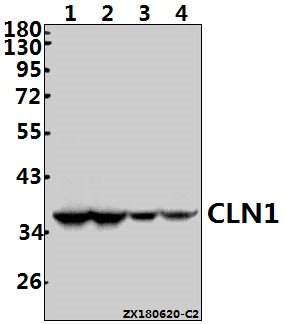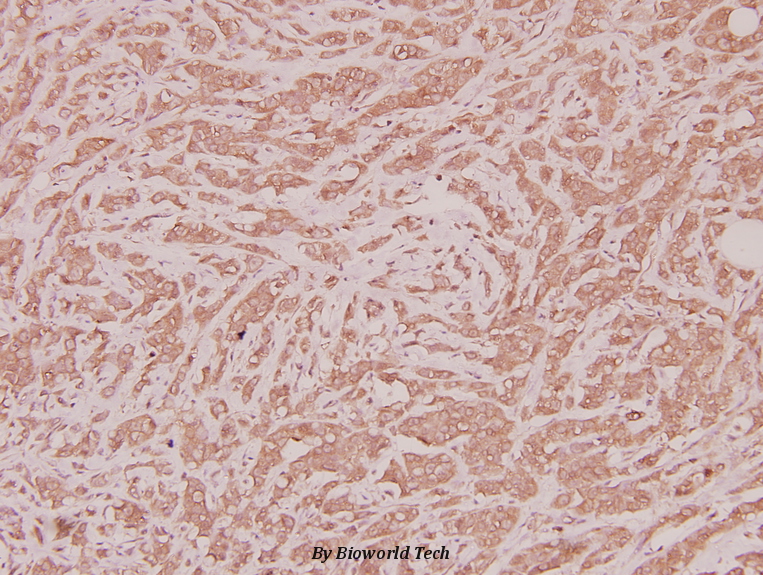Product Name :
CLN1 (I65) polyclonal antibody Background :
CLN1 (ceroid lipofuscinosis 1), also known as PPT, INCL or PPT1 (palmitoylprotein thioesterase 1), is a 306 amino acid glycosylated protein that localizesto lysosome and is a member of the palmitoyl-protein thioesterase family.CLN1 functions to remove thioester-linked fatty acyl groups from a variety ofsubstrates, such as as palmitate, from modified cysteine residues in proteinsorpeptides during lysosomal degradation. Defects in the gene encoding CLN1are a causeof infantile neuronal ceroid lipofuscinosis 1 (CLN1 or INCL) andneuronal ceroid lipofuscinosis 4 (CLN4). Neuronal ceroid lipofuscinoses areprogressive neurodegenerative, lysosomal storage diseases characterized byintracellular accumulation of autofluorescent liposomal material, with clinicalsymptoms including seizures, dementia, visual loss and/or cerebral atrophy. Product :
Rabbit IgG, 1mg/ml in PBS with 0.02% sodium azide, 50% glycerol, pH7.2 Storage&Stability :
Store at 4°C short term. Aliquot and store at -20°C long term. Avoid freeze-thaw cycles. Specificity :
CLN1 (I65) polyclonal antibody detects endogenous levels of CLN1 protein. Immunogen :
Synthetic peptide, corresponding to amino acids 50-100 of Human CLN1. Conjugate :
Unconjugated Modification :
Unmodification
CLN1 (I65) polyclonal antibody Background :
CLN1 (ceroid lipofuscinosis 1), also known as PPT, INCL or PPT1 (palmitoylprotein thioesterase 1), is a 306 amino acid glycosylated protein that localizesto lysosome and is a member of the palmitoyl-protein thioesterase family.CLN1 functions to remove thioester-linked fatty acyl groups from a variety ofsubstrates, such as as palmitate, from modified cysteine residues in proteinsorpeptides during lysosomal degradation. Defects in the gene encoding CLN1are a causeof infantile neuronal ceroid lipofuscinosis 1 (CLN1 or INCL) andneuronal ceroid lipofuscinosis 4 (CLN4). Neuronal ceroid lipofuscinoses areprogressive neurodegenerative, lysosomal storage diseases characterized byintracellular accumulation of autofluorescent liposomal material, with clinicalsymptoms including seizures, dementia, visual loss and/or cerebral atrophy. Product :
Rabbit IgG, 1mg/ml in PBS with 0.02% sodium azide, 50% glycerol, pH7.2 Storage&Stability :
Store at 4°C short term. Aliquot and store at -20°C long term. Avoid freeze-thaw cycles. Specificity :
CLN1 (I65) polyclonal antibody detects endogenous levels of CLN1 protein. Immunogen :
Synthetic peptide, corresponding to amino acids 50-100 of Human CLN1. Conjugate :
Unconjugated Modification :
Unmodification
-
 Western blot (WB) analysis of CLN1 (I65) pAb at 1:1000 dilution Lane1:A549 whole cell lysate(40ug) Lane2:HepG2 whole cell lysate(40ug) Lane3:The Brain tissue lysate of Mouse(40ug) Lane4:The Spleen tissue lysate of Rat(40ug)
Western blot (WB) analysis of CLN1 (I65) pAb at 1:1000 dilution Lane1:A549 whole cell lysate(40ug) Lane2:HepG2 whole cell lysate(40ug) Lane3:The Brain tissue lysate of Mouse(40ug) Lane4:The Spleen tissue lysate of Rat(40ug) -
 Immunohistochemistry (IHC) analyzes of CLN1 (I65) pAb in paraffin-embedded human breast carcinoma tissue at 1:100.
Immunohistochemistry (IHC) analyzes of CLN1 (I65) pAb in paraffin-embedded human breast carcinoma tissue at 1:100.
Bioworld Biotech only provide peptides for our antibodies and do not provide additional peptide customization services.
Price/Size :
USD 368/1mg/vial
Tips:
For phospho antibody, we provide phospho peptide(0.5mg) and non-phospho peptide(0.5mg).Describe :
Blocking peptides are peptides that bind specifically to the target antibody and block antibody binding. These peptide usually contains the epitope recognized by the antibody. Antibodies bound to the blocking peptide no longer bind to the epitope on the target protein. This mechanism is useful when non-specific binding is an issue, for example, in Western blotting (WB) and Immunohistochemistry (IHC). By comparing the staining from the blocked antibody versus the antibody alone, one can see which staining is specific; Specific binding will be absent from the western blot or IHC performed with the neutralized antibody.Formula:
Synthetic peptide was lyophilized with 100% acetonitrile and is supplied as a powder. Reconstitute with 0.1 ml DI water for a final concentration of 10 mg/ml.The purity is >90%,tested by HPLC and MS.
Storage:
The freeze-dried powder is more stable. For short time at 2-8°C. For long term storage store at -20°C.
Note :
This product is for research use only (RUO only). Not for use in diagnostic or therapeutic procedures.
 CLN1 (I65) polyclonal antibody
CLN1 (I65) polyclonal antibody  Datasheet
Datasheet COA
COA MSDS
MSDS SHIP
SHIP